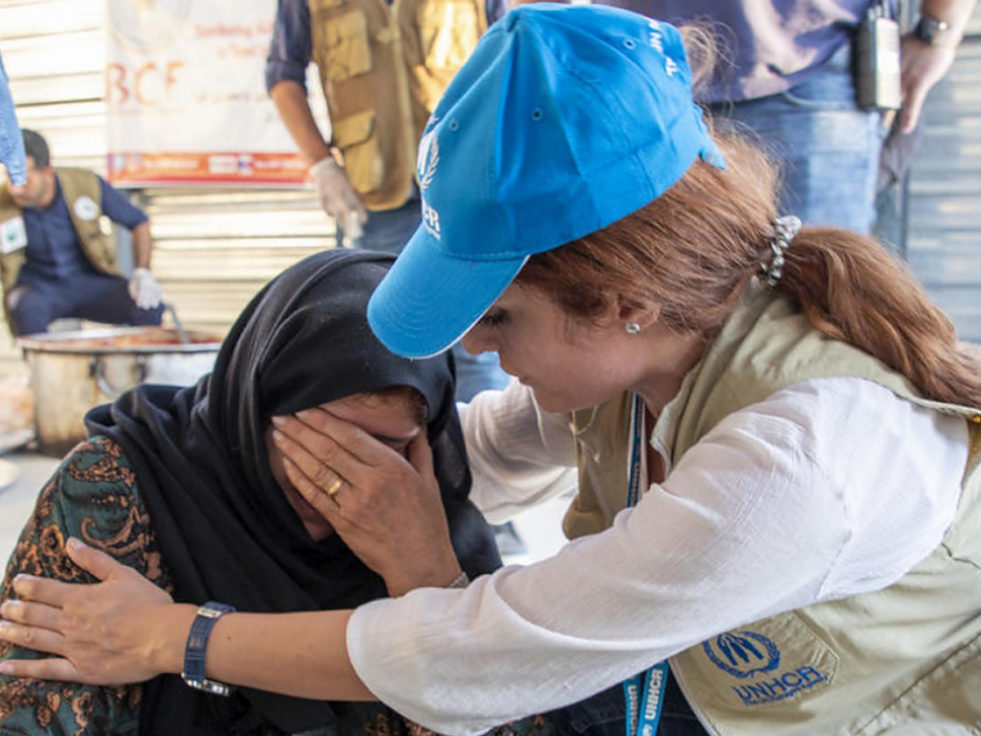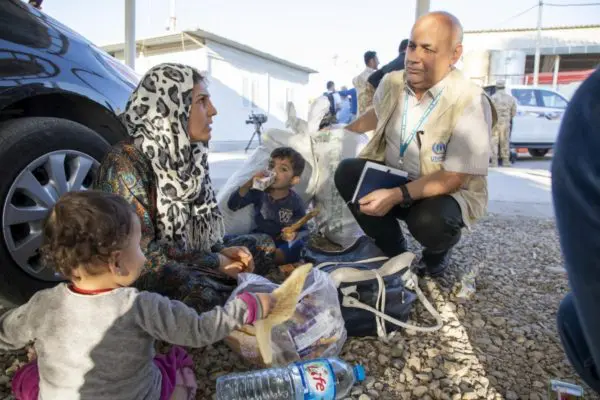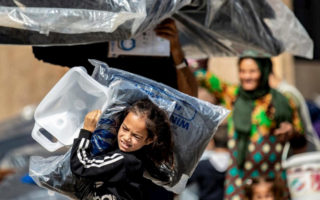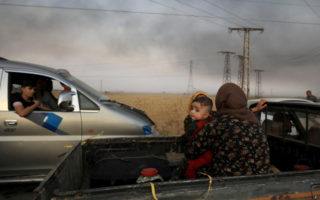
A Syrian woman is comforted by a UNHCR staff member after arriving at Bardarash refugee camp. © UNHCR/Rasheed Hussein Rasheed
As number of Syrian refugees crossing into Kurdistan Region of Iraq reaches some 10,000, one new arrival tells of crowded route to border and her fears of coming winter.
By Rasheed Hussein Rasheed in Bardarash Camp, Kurdistan Region of Iraq
When she finally disembarked at Bardarash camp near Duhok from a convoy of buses carrying hundreds of newly arrived refugees from northeast Syria, 64-year-old Amina was exhausted after trekking for hours to cross the border into the Kurdistan Region of Iraq to reach safety.
But like most of the 8,400 Syrian refugees now living in the camp after arriving over the past ten days, her physical discomfort was eclipsed by the psychological anguish of being forced to leave her home.
“We have not stopped crying since we arrived here yesterday,” she said, sitting in one of thousands of tents erected to provide shelter for the new arrivals. “Our situation is bad here. We used to live in a house which was clean and big. It cannot be compared to living here. It is very difficult.”
DONATE NOW TO HELP SYRIAN REFUGEES
Amina left her hometown of Al-Malikiyah in the far northeastern corner of Syria, close to the borders of Turkey and Iraq, with two daughters and other family members after witnessing airstrikes close to their home. They chose to leave in case the fighting became more intense and to avoid the possible conscription of male family members, she said.
“Everyone was fleeing.”
Their route was thronged with people from across northeast Syria heading for the border to escape the recent fighting and the threat of further conflict, she said.
“The route here was overcrowded. Everyone was fleeing, no one wanted to stay,” Amina said. “I saw a woman walking with two children while holding her infant in her arms. There were elderly people too. You know how it looks when many people flee at once.”
As with all those arriving at the camp, Amina and her family were provided with a tent, blankets, mattresses and other essential items.
UNHCR – the UN Refugee Agency – is registering all new arrivals, and together with its partners providing health care and protection services, including psycho-social support and specific services for unaccompanied children and people with specific needs.
Of more than 10,000 Syrian refugees who have crossed into northern Iraq since last Monday, three-quarters are women and children. While most are being sheltered at Bardarash camp, those with relatives living in the area are gradually being allowed to leave the camp and join their families.
“This is not a life.”
With arrivals at Bardarash averaging between 900-1200 people each day, the camp is likely to reach full capacity within the coming week, UNHCR officials say, and the Kurdish regional authorities are making plans to open more camps to cope with the continued influx.
Aside from those who have crossed the border into Iraq since Operation Peace Spring began on 9 October, nearly 180,000 people including close to 80,000 children have so far been internally displaced within the region, according to UN figures published on Tuesday.
Sitting in her tent surrounded by the few items she now possesses, Amina expressed her hope for an end to the fighting and the chance to return home rather than having to live under canvas for the approaching winter.
“If it rains, the situation will worsen. I hope water will not enter my tent,” she said. “We want them to stop this war. This is not a life. We are human and we want to stay peacefully in our homeland.”
Originally published by UNHCR on 24 October 2019





